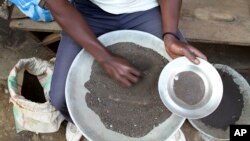The U.S. Securities and Exchange Commission is reconsidering its rule requiring public companies to report their use of minerals from Congo, where multiple armed groups have stakes in the vast country's trillion-dollar mineral wealth.
A change by the SEC could either benefit the armed groups and increase the region's potential for conflict or help everyday Congolese who have felt the economic pinch as some companies stayed away, experts say.
In a statement earlier this week, the newly appointed Republican acting chairman of the SEC, Michael Piwowar, called the rule "misguided," saying there is little proof it has reduced conflict or eased humanitarian suffering in Congo. In addition, he said, it may be creating a "vacuum filled by those with less benign interests" that could undermine U.S. security interests. He ordered the SEC to review the regulation.
The SEC issued the rule in 2012 under the Dodd-Frank financial overhaul law. It has required public companies to disclose information about their use of minerals from Congo, where armed groups linked to atrocities have profited from minerals used in electronics, jewelry and other goods.
Companies that use the designated minerals from Congo and neighboring countries in their products must report annually on their efforts to trace the so-called "conflict minerals" back to their sources. The regulators said stricter reporting requirements might help curb the violence in Congo and would make companies more accountable to shareholders.
For years, armed groups and criminal elements in the Central African nation have fed off the illicit trade of gold, tin, tantalum and tungsten, according to reports by a United Nations panel of experts.
There could be $24 trillion in untapped mineral reserves in the Congo, the U.N. says.
The SEC rule unintentionally harms miners and local communities, some experts say, because companies have found it difficult to certify that minerals haven't been linked to armed groups.
Last year, Apple reported that while a third party verified its supply chain was free of minerals that financed armed groups, it was still not enough to be entirely sure its minerals were conflict-free because of opaque industry practices in Congo.
Carly Oboth, a policy adviser with the Global Witness advocacy group, criticized this week's SEC statement, saying it had information that was "outdated and characterized it in a way that is not entirely accurate."
It is unclear if the SEC rule has really taken resources away from armed groups, but it has been a "great mobilizer" for the business community to act more responsibly, said Ben Radley, a researcher at the International Institute of Social Studies. "It certainly had negative impacts on artisanal mining, households and communities" in Congo, he said.
The conflict minerals rule "has contributed a lot to the reduction of violence in mining sites," said Richard Mukena, director of the human rights program at African Resources Watch in Congo.
But he pointed out that the vast country has other political drivers of conflict, saying it is "not only due to illegal exploitation."




